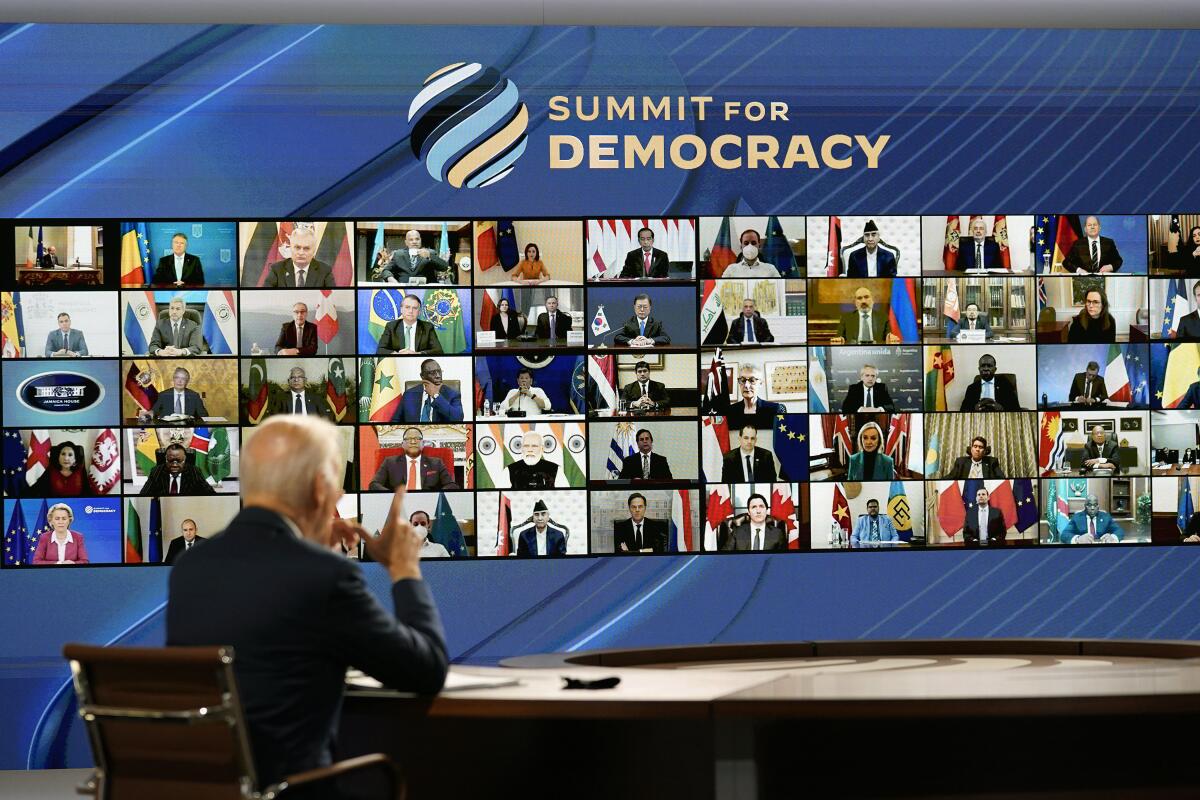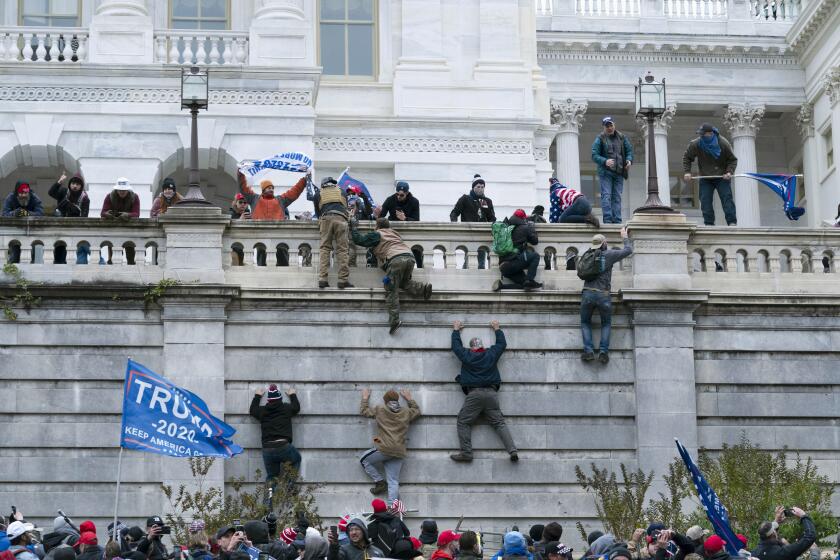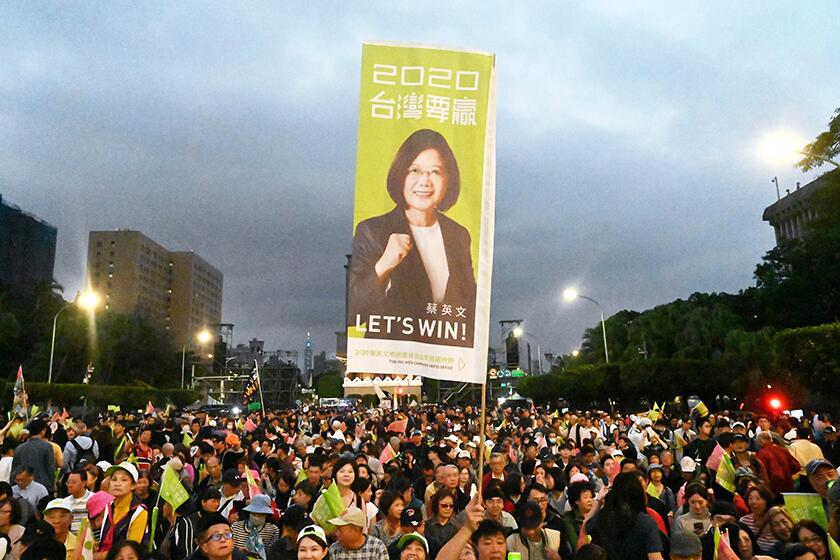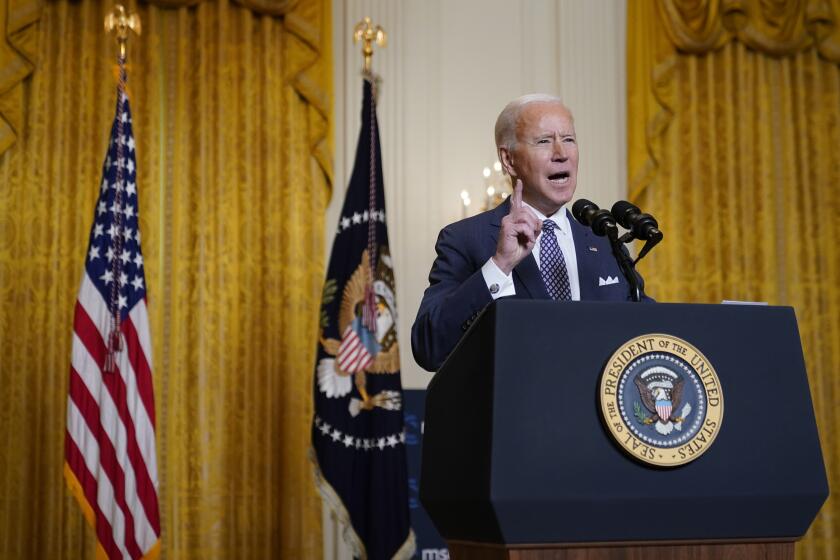News Analysis: Biden convenes ‘democracy summit’ as America’s system grows imperiled

- Share via
WASHINGTON — President Biden has framed his agenda broadly as an endeavor to show the world that democracies can deliver.
But as he convened leaders from more than 100 countries in a virtual “Summit for Democracy” on Thursday, there are growing questions about the stability of America’s own democracy — and the credibility of a president proselytizing to others democratic values that no longer seem to unite his own country.
Acknowledging the awkwardness of the U.S. hosting such a summit when its own democratic institutions are under assault, an administration official told reporters that “the United States is approaching the summit from a place of humility.”
“The Biden-Harris administration has made clear that efforts to bolster democracy globally begin by working diligently and transparently to strengthen its foundations at home,” the official said Tuesday, speaking on condition of anonymity to preview the event. The official added: “No democracy is perfect, ourselves included.”
Opening the summit Thursday morning, Biden expressed that same humility, saying that preserving democracy is “the defining challenge of our time,” while framing the two days of meetings as a chance for a range of nations to “lock arms” and strengthen democratic institutions.
“Democracy needs champions,” he said. “Here in the United States, we know as well as anyone, renewing our democracy and strengthening our democratic institutions requires constant effort.”
America’s struggles, experts say, can be traced to the tribalism, nihilism and authoritarianism that imbue the body politic in the wake of President Trump’s four years in office, his electoral defeat and subsequent falsehood-filled campaign about the election having been “stolen.” Many of his adherents deeply believe in the lie, which Trump continues to spread, deepening the cracks in the country’s democratic foundation.
Republicans in Congress, who feared for their own lives on Jan. 6 when thousands of Trump supporters violently overtook Capitol Police officers to halt the certification of Biden’s victory, snapped back quickly into a partisan posture over the insurrection, mostly refusing to cooperate with a bipartisan investigation of the deadly riot, decrying it as a political witch hunt and even defending the insurrectionists.
The attack on the U.S. Capitol has spurred global concerns about the future of democracy and what lies ahead as alliances are being challenged.
At the same time, Republican lawmakers in several states — using Trump’s baseless fraud claims as a pretext — have passed laws restricting voter access and, in some cases, enabling state lawmakers to reverse election results certified by traditionally nonpartisan election officials.
Vice President Kamala Harris, addressing the summit Thursday afternoon, referenced the new laws, calling them “an intentional effort to exclude Americans from participating in our democracy.” Harris said protecting voting rights was “a top priority” of the Biden administration and pointed to increased efforts by the Justice Department to enforce federal voting rights laws.
But Democrats have been unable to mount a federal response, constrained by razor-thin majorities and lacking the unanimity required to circumvent the filibuster rule that requires 60 Senate votes to advance legislation.
“The U.S. has lost a lot of its moral authority on this in part because we are so divided and dysfunctional as a country, we have our own leaders questioning the fairness of our institutions,” said Nate Persily, a constitutional law professor at Stanford. “When leaders are sending signals to their adherents that the democracy is ‘rigged,’ it’s no surprise you have big swaths of the population who believe that, which can lead to violence. It’s a prescription for instability.”
The U.S. is not the only country grappling with such dangers. Many represented at the two-day confab are democratic in name only — and the administration has already taken some flak for its somewhat confounding guest list. The White House has invited countries beset by human rights violations (e.g. Pakistan, which withdrew from the event Wednesday) and led by aspiring autocrats (Brazil), while excluding others (including Hungary, a European Union member, and Turkey, a North Atlantic Treaty Organization ally) where democratic guardrails have crumbled in recent years.
Jen Psaki, the White House press secretary, said this week that the administration’s guest list wasn’t meant to convey a “stamp of approval” of every attending country.
President Biden’s invitation for Taiwan to participate in his democracy summit draws the island deeper into the struggle between China and the U.S.
Democracy has been retreating worldwide for years, a slide that has accelerated amid the COVID-19 pandemic as citizens frustrated by the duration of the crisis have grown dissatisfied with government responses, according to a new Pew Research survey.
The current reality is a far cry from the supposedly inexorable shift toward democracy many assumed would occur after the end of the Cold War more than three decades ago. According to Freedom House, a nonpartisan organization based in Washington that assesses democratic conditions around the world, a global 15-year decline in freedom has accelerated in recent years, with the U.S. dropping precipitously of late.
Michael Abramowitz, president of Freedom House, said the democracy summit was an acknowledgment of the troubling trend. “No question there are problems in the U.S., but it’s important Biden put this marker down,” he said. “The U.S. is still the world’s largest and most influential democracy. No one else could have had this summit and had 100 countries come to it.”
Secretary of State Antony J. Blinken referenced the Freedom House data in a USA Today op-ed on Wednesday explaining why the administration felt the need to hold the summit. “Democracy is facing a moment of reckoning,” he wrote, adding that “all participating governments will make concrete commitments toward three goals: countering authoritarianism, fighting corruption and protecting human rights.”
As the summit began, Biden announced a new pledge of $424 million to support initiatives bolstering free and independent media, fighting corruption, defending free and fair elections, strengthening democratic reformers and harnessing technology for democratic renewal.
President Biden officially reaffirmed U.S. fealty to the transatlantic alliance at two global conferences Friday, seeking to regain allies’ trust.
Susan Stokes, director of the Center on Democracy at the University of Chicago, said the summit was “a recognition of the fact that democracy is on the defensive around the world.” Even if the gathering “is a little performative,” she said, it could have some impact.
“Having a summit that produces some video and audio that can go back to domestic audiences in the U.S. and other countries that shows there’s this group of people listening and talking about democratic values, that can make a difference in the broad public sense of where the momentum is,” Stokes said.
Brendan Nyhan, a political scientist at Dartmouth and the founder of Bright Line Watch, a group monitoring the status of American democracy, suggested that strengthening partnerships around the cause of democracy is a pragmatic reaction to populist authoritarian movements growing around the world.
American “conservatives are making pilgrimages to Hungary; far-right parties in Europe want to ‘make Austria great again’ — this is an international movement. I don’t think people realize the allegiances that have been formed,” Nyhan said.
“It’s important to remind people that democracy isn’t a given,” he continued. “We only became a full-fledged democracy with the passage of civil rights a few decades ago. And we could lose what we’ve achieved. It’s important for everyone in politics to be reminded that what we’ve inherited is not fixed, not a given, and it won’t necessarily last forever.”
Times staff writer Noah Bierman contributed to this report.
More to Read
Get the L.A. Times Politics newsletter
Deeply reported insights into legislation, politics and policy from Sacramento, Washington and beyond. In your inbox three times per week.
You may occasionally receive promotional content from the Los Angeles Times.














